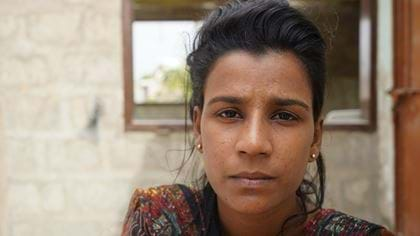Mental health: Neelam's story

Neelam had a happy childhood and worked hard at school. ‘She was really good at sewing – better than a professional tailor,’ says her mother.
Neelam’s older cousin Shiba was her best friend and confidant, until Shiba, at the age of 20, took her own life.
That day, Shiba had washed, dressed and eaten. She was due to go out, but first she took the laundry up to the roof to hang it out. It was there that she killed herself.
Neelam and her grandmother found her. Neelam was traumatised and sat cradling her cousin’s body, repeatedly asking what was wrong with her ‘baji’.
Over the following weeks, Neelam became more and more withdrawn. She would sit alone, and often wake up in the night, talking to herself or hallucinating.
Despite the heat, she spent hours pacing up and down, dripping with sweat. And for a long time, she didn’t take care of herself: she didn’t wash herself or her hair, and it became dirty and tangled.
No one in the family had experience of mental illness, and at first her parents couldn’t understand what was happening or how to help their daughter. Soon, even Neelam’s closest friends stopped seeing her, believing that she was possessed.
Neelam’s father was not in favour of consulting healers, but her parents did take her to receive prayers. It wasn’t until a relative heard of the work of the British Asian Trust and their partner Basic Needs Pakistan (BNPK) that Neelam was seen by a doctor who had had mental health training.
At last, after years of distress, Neelam was given a diagnosis – of schizophrenia - and the correct medicine. Neelam continues to have counselling sessions with a psychiatrist. The medicine she has to take is expensive, but the family make it a priority even if it means going without things themselves.
‘My daughter was very, very, very unwell,’ Neelam’s mother says. ‘Now she’s a lot better.’ ‘She likes to be by herself; her conversation doesn’t always make sense; sometimes she laughs at the wrong things – but she understands what you say to her. Sometimes she does chores, sometimes she doesn’t – it depends on her mood.’
Much of the community are understanding, but some stare and make fun of Neelam, and the effect on the family has been profound. Neelam’s brother is still upset by what has happened and is very protective of Neelam. ‘We don’t take her out unless her father is with us,’ her mother adds. And her mother, too, after all she has been through, has found herself experiencing anxiety that something even worse may happen: ‘Every day,’ she says, ‘I would feel the earth shift beneath my feet that Neelam, too, had died.’
Neelam’s family know that the future won’t be easy. ‘I wish that she gets well, gets married and has a family, but in truth we wouldn’t marry someone else’s daughter with mental health issues, so who would take our daughter?’ They also worry about the implications of how a future sister in law may react.
Neelam’s mother has experienced the benefit of treatment for her daughter’s mental health problems and now she talks openly about mental health problems with others in her community. As she says: ‘This can happen to anyone.’
Through our local partner organisations in Pakistan, The British Asian Trust is determined to end stigma and provide vital community mental health services.
All donations or Zakat given towards our mental health projects in Pakistan during our 2019 Ramadan appeal are being match funded by CareTech Foundation and COSARAF Charitable Foundations; doubling the impact of the money given.
*Due to sensitivities surrounding the stigma attached to mental health issues in the country, this person has requested their name be changed and identity not revealed.
April 2019
